Premium Only Content

RT News - December 31st 2022
Multiple strikes and Blasts are reported across Ukraine, with explosions seen in the nation's capital, where a hotel was damaged, with unconfirmed reports saying it housed foreign advisors. Officials say electricity has been lost in the city and surrounding regions.
There have also been strikes by Ukraine forces in Russia, Belgorod and Kramatorsk, near to the front lines of the country.
In Lugansk a terrorist attack has been foiled, it was stopped by Russian Special Forces. This is the second this week. During the attempted attack 2 people were killed. A cache of terrorist weapons and ammo was discovered.
More than eighty Russian soldiers are returned from Ukrainian captivity where they were in 'mortal danger', according to the Ministry of Defence. The men are set to receive treatment and rehabilitation on home soil.
Pres. Putin visited the Russian southern military district close to the Ukraine border. One of his tasks was presenting military awards.
Mariupol, a new start. A look back at events of 2022 and hopes for it's future. Report from Eva Bartlett.
2022 almost gone for most of us, RT/Ruptly looks back at the year in images.
2023 is coming upon us, RT look at the celebrations and hopes happening across the world. President Xi addressed China and says no problems must be insurmountable between Taiwan and China. "One family, prosperity in unity"
The Western backed interim leader of Venezuela, Juan Guaido, has been voted out by Venezuelan lawmakers and will get the boot, next week. Feature.
India calls for global assistance for the State's crypto-currency regulation to protect all. Report from RT and comments from Rajagopal Menon (WAZIRX)
Pope Benedict XVI has died, he was 95.
Mali has jailed soldiers from the Ivory Coast on anti-government conspiracy charges. The trial was not open to the public. Report.
It's summer in Antartica and RT has opened some TV stations.
===================================
Below: 1) --- Hollande backs up Merkel revelation on Donbass peace
2) --- Confessions by Hollande and Merkel are ‘formalization of betrayal’ – top Russian senator
3) --- ‘The Nutcracker’: How Tchaikovsky created one of the world’s most famous ballets
4) --- Exotic dancer wants love-child she had with US president’s son to be a Biden – media
5) --- Xi says Happy New Year to Putin
6) --- Donetsk reveals number of civilians killed in 2022
7) --- Türkiye agrees to withdraw troops from Syria following Moscow talks – media
7a) --- Turkish defense minister speaks on Syria after Moscow talks
8) --- How the year 2022 ended the American unipolar era
=========================================
via RT website 30 Dec, 2022 18:42
1) --- Hollande backs up Merkel revelation on Donbass peace
Ex-French leader agreed with former German counterpart's description of the real purpose behind Minsk agreements
The 2014 Minsk Agreement was indeed a ploy to buy Ukraine time and should be credited for Kiev’s “successful resilience” now, former French president Francois Hollande said on Friday. Confirming former German chancellor Angela Merkel’s assessment of the truce, Hollande also blamed US weakness for the failure to deter Russia.
Earlier this month, Merkel described Minsk as “an attempt to give Ukraine time” to build up its military. Speaking with the Kyiv Independent, a pro-government Ukrainian outlet, Hollande agreed, saying Merkel was “right on this point.”
“Since 2014, Ukraine has strengthened its military posture. Indeed, the Ukrainian army was completely different from that of 2014. It was better trained and equipped. It is the merit of the Minsk agreements to have given the Ukrainian army this opportunity,” Hollande said, adding that it also stopped the advance of Donbass “separatists” on Mariupol.
Hollande was president between 2012 and 2017, choosing not to run for re-election after polls showed him as the least popular French leader in recent history, with a 97% disapproval rating. In Friday’s interview, he credited himself for wanting “maximal” sanctions against Russia, while other EU leaders were reluctant.
Here Hollande diverged from Merkel, pointing out she greenlit the Nord Stream 2 gas pipeline in 2015, while he canceled the sale of Mistral-class ships to Moscow. The former French leader also had harsh words for his American counterparts, accusing Barack Obama of “American withdrawal from the international scene” in Syria, Donald Trump of undermining NATO, and Joe Biden of “the rout in Afghanistan” that signaled “weakness in the Western camp” to Russian President Vladimir Putin.
By contrast, Hollande praised Ukrainian President Vladimir Zelensky for the “ability to appeal to the whole world and mobilize the Ukrainian nation,” saying this will be “central to the outcome of the war and the respect of Ukraine’s territorial integrity.”
According to Hollande, the conflict will end when Russia fails, and then the Minsk agreements “can be resurrected to establish a legal framework already accepted by all parties.”
Moscow has yet to comment on the former French leader’s statements. Putin has responded to Merkel’s revelations by saying he had thought her honest, and that trust between Russia and the West was currently “almost at zero,” making future negotiations difficult at best. He also said her comments vindicated his decision to send troops into Ukraine and that in hindsight, the military operation should have started sooner.
https://www.rt.com/news/569201-hollande-merkel-minsk-ukraine/
================================================
31 Dec, 2022 08:39
2) --- Confessions by Hollande and Merkel are ‘formalization of betrayal’ – top Russian senator
The West has proven it only cares about territory in Ukraine, not people, Konstantin Kosachev says
Thousands of people have lost their lives in eastern Ukraine since 2014 because the West treated the Minsk agreements as scrap paper, the vice speaker of Russia’s upper house of parliament said on Saturday.
Senator Konstantin Kosachev was reacting to an admission by former French president Francois Hollande that the Minsk agreements were actually a ploy to buy time for the Kiev government to strengthen its military. This move should be credited for Ukraine’s “successful resilience” to Russia in the ongoing conflict with its neighbor, he added.
Hollande was echoing a statement by former German chancellor Angela Merkel, who described the Minsk accords in December as “an attempt to give Ukraine time” to build up its armed forces.
The Minsk-1 and Minsk-2 deals were signed in 2014 and 2015 following mediation by Germany, France and Russia. They were designed to put an end to fighting between Kiev and the People’s Republics of Donetsk and Lugansk by giving them special status within the Ukrainian state. Kiev’s failure to implement those agreements has been cited as one of the reasons for Moscow launching its military operation on February 24.
“For the West, the territorial integrity of Ukraine is all about control over land and not about achieving social consensus. It’s about territory, not people. It’s about violence, not negotiations,” Kosachev wrote on Telegram.
This approach “directly contradicts so-called European values,” he said. The senator noted that Western attitudes towards the territorial integrity of the UK and Spain have been completely different in the face of Scotland and Catalonia’s push for independence.
“The confessions by Merkel and Hollande are a formalization of betrayal… The price of this betrayal is thousands of human lives lost over the past eight years of civil war in Ukraine. The civil war that the West didn’t stop by treating the Minsk agreements as scrap paper,” Kosachev wrote.
According to the UN estimates, more than 14,000 people were killed in Donbass between 2014 and early 2022.
The only co-author of the Minsk agreements that genuinely tried to act as a guarantor was Russia, the senator claimed. Moscow sided with the people and left the territorial issue aside for as long as “it was still possible to implement the Minsk accord,” he added.
The People’s Republic of Donetsk and Lugnask, as well as Zaporozhye and Kherson regions, joined the Russian state in autumn after holding referendums. Kiev and its Western backers have called the votes a “sham” and refused to recognize the results.
https://www.rt.com/russia/569222-hollande-merkel-minsk-ukraine/
================================================
Feature 31 Dec, 2022 13:38 By Anastasia Safronova, RT editor
3) --- ‘The Nutcracker’: How Tchaikovsky created one of the world’s most famous ballets
The masterpiece was first staged 130 years ago
This year, ‘The Nutcracker’ marked its 130th anniversary. It is widely acknowledged that this masterpiece, set to the music of Russian composer Pyotr Ilyich Tchaikovsky is the most famous ballet in the world. Indeed, it's hard to imagine any Christmas or New Year celebration without the universally known tunes of the Dance of the Sugar-Plum Fairy or the Russian Dance. So, it’s amazing that, when first presented to the public, ‘The Nutcracker’ was met with quite an icy welcome.
“Get rid of the ballet”
Work on ‘The Nutcracker’ did not come easily for Tchaikovsky. In 1890, he received an order for a one-act opera and two-act ballet from the director of the Imperial Theatre (currently the Mariinsky Theatre in St. Petersburg) Ivan Vsevolozhsky. The next year, Tchaikovsky set to work – and, judging by his letters, it was quite a stressful period for him.
The composer was apparently more engrossed by the opera than the ballet. He chose the Danish play ‘King Rene’s Daughter’ by Henrik Hertz and started to compose an opera titled ‘Iolanta’. In his letters, Tchaikovsky wrote about being “in love” with ‘Iolanta’. He noted how fascinating the work was and that he expected “to make them [the audience] cry.” Meanwhile, he lamented how “tired” he had become of ‘The Nutcracker’ and how he wanted to “get rid” of it.
Tchaikovsky did not choose the plot for the ballet himself – he got the idea from Vsevolozhsky and the Imperial Theatres’ choreographer Marius Petipa. The tale of the Nutcracker was initially written by German Romantic author E.T.A. Hoffmann and first published in 1816. It is a much darker and spookier tale than those who only know the ballet would imagine. In 1844, the French writer Alexandre Dumas re-told the story, making it lighter and more appropriate for children.
Choreographer Marius Petipa, who was French by nationality and didn’t speak German, used the French version for the ballet. In his initial drafts for the libretto, Petipa even wanted to make references to the French Revolution and included the Carmagnole – a song and a dance popular during the French Revolution. Later, however, the concept was changed and any links to the Revolution vanished.
‘Iolanta’ and ‘The Nutcracker’ were both scheduled to be performed in December 1891. However, Tchaikovsky needed more time. In April of that year, he wrote to his brother about a “crisis” he was suffering and revealed that he had asked Vsevolozhsky “not to be angry” with him and let him present the opera and the ballet during the 1892-1893 season. “They think I can sit down and compose an opera in five minutes,” Tchaikovsky exclaimed. In fact, it had been a busy time for the composer. In May of the same year, he traveled to the US and took part in the opening of Carnegie Hall in New York.
An instrument with unique effects
Still, work on ‘The Nutcracker’ encompassed more than just disappointment. During a visit to Paris, Tchaikovsky discovered a brand-new musical instrument called the celesta, which had been invented by Parisian harmonium builder Auguste Mustel and was first used by French composer Ernest Chausson.
“I’d prefer that it [celesta] would not be shown to anyone,” Tchaikovsky wrote in a letter while giving orders about transportation of the instrument to St. Petersburg. “I fear that Rimsky-Korsakov and Glazunov become aware of it and use its unique effects before myself.” It should be noted that the two people mentioned in the letter are very famous Russian composers.
Tchaikovsky used the celesta in the music for the Dance of the Sugar Plum Fairy.
Mixed reaction
Tchaikovsky recalled that he had finished the draft to his ballet “with feverish haste” and “with constant doubts” in his competence.
I composed the ballet with an effort, feeling a decline in ingenuity.
The composer lamented that ‘The Nutcracker' is “infinitely worse” than his previous ballet, ‘The Sleeping Beauty’.
In 1892, Petipa handed over the work on ‘The Nutcracker’ to assistant ballet master Lev Ivanov, who completed the choreography. The ballet was presented in December and elicited very mixed reactions. Critics called it “childish” and “boring” and also lashed out at the “lack of sense.”
Still, the ballet remained in the repertory and eventually moved beyond St. Petersburg. In 1919, ‘The Nutcracker’ was staged at the Bolshoi Theatre in Moscow for the first time. It subsequently underwent numerous transformations, with every new version slightly altering the tale. Many critics believe that one of the most successful versions of ‘The Nutcracker’ was staged by the long-time artistic director of the Bolshoi Theatr, Yuri Grigorovich, in 1966. This version is still running at the Bolshoi and procuring a ticket to a performance during the New Year season is a daunting task.
As for the Mariinsky Theatre, the version of ‘The Nutcracker’ created by Vasily Vainonen in 1934 is still performed on the historical stage, while the venue’s new stage shows a modern version created by artist Mikhail Chemiakin and choreographer Kirill Simonov.
The latter adaptation is a bit darker than the traditional interpretation. The Grigorovich and Vainonen versions are sweet fairy tales in which a young girl Marie (sometimes called by her Russian name Masha, or Clara in other versions) falls asleep and dreams that she joins the Nutcracker’s battle against an army of mice. The Nutcracker is then transformed into a prince, who takes Marie to the kingdom of sweets. The version by Chemiakin and Simonov, however, presents a story of a lonely child misunderstood by the adults. Masha tries to escape in her imagination and at the end of her journey with the Nutcracker, she turns into a sugar figurine on a giant cake.
‘The Nutcracker’ across the world
Audiences abroad were introduced to ‘The Nutcracker’ only in the 20th century. Initially, only fragments of the ballet were performed by world-famous ballerina Anna Pavlova and her troupe, as well as by the members of Sergey Diaghilev’s Ballets Russes company. The trailblazing Diaghilev came upon the idea of mounting a traditional ballet that could be a long-running blockbuster, with the aim of bolstering his perpetually desperate finances, but he staked his bet on a different Tchaikovsky ballet: ‘The Sleeping Beauty’. His production did not succeed. His protégé George Balanchine, however, would achieve just such a cash cow with ‘The Nutcracker’.
Prior to Balanchine, meanwhile, in 1934, ‘The Nutcracker’ was staged in London by Nicholas Sergeyev, a choreographer who fled the country during the Russian Revolution. The version currently performed by the Royal Ballet is Peter Wright’s from 1984, which closely follows the tradition of Lev Ivanov’s original choreography.
In the US, it was the Balanchine version of the ‘The Nutcracker’ from 1954 that became a true sensation. This was actually not the first version of the ballet to be seen on American soil: in 1944, it was staged by William Christensen for the San Francisco Ballet. But it was Balanchine’s version that turned ‘The Nutcracker’ into a hit that is now performed every year all across the country with overwhelming success. In 1993, this version was used for the Christmas movie featuring ‘Home Alone’ star Macaulay Culkin as the Nutcracker.
‘Cancel culture’ victim
Despite all the success and a more than century-long history, ‘The Nutcracker’ has joined the ranks of classical works of art that have recently suffered from ‘cancel culture’. In 2021, Berlin State Ballet scrapped the ballet from its Christmas repertoire amid concerns over the Chinese and Oriental dances. It was feared that the performance contained “racist elements.” The same year, Scottish Ballet also decided to tackle what it called “inappropriate cultural stereotypes.” With this aim, the company updated the costumes and choreography in the Chinese- and Arabian-inspired scenes to “remove elements of caricature.”
Still, despite the conflicts and obstacles, ‘The Nutcracker’ doesn’t seem likely to vanish from the stages across the world anytime soon. What is the secret behind its success? Fyodor Lopukhov, an important early Soviet choreographer who is credited with preserving much of the classical ballet heritage following the Revolution, explained it this way: “‘The Nutcracker’ is very complicated. The problem is not about how to perform the story, but how to interpret it. You should plunge into the depths. Otherwise you’ll fail.”
https://www.rt.com/russia/569113-nutcracker-story-of-success/
This is my favourite version of The Nutcracker. There are others of course https://youtu.be/AXPn1jPHHgI?list=PLW3D5Edk9Gfijgxuspb54f8_E5239dq0m
============================================
Via RT website 30 Dec, 2022 20:15
4) --- Exotic dancer wants love-child she had with US president’s son to be a Biden – media
The estranged daughter of Hunter Biden would benefit from her father’s powerful family name, her mother has reportedly claimed
Lunden Roberts, the former exotic dancer who gave birth to Hunter Biden’s love child in 2018, is reportedly seeking legal permission for her daughter to use her father’s surname.
The 4-year-old girl, who has never met her father or her paternal grandfather, US President Joe Biden, would “benefit from carrying the Biden family name,” Roberts said this week in an Arkansas court filing. The request, which was first reported by the Northwest Arkansas Democrat Gazette on Thursday, was filed in a paternity case that Hunter Biden reopened in September to seek a reduction in his child support payments.
The “Biden name is now synonymous with being well educated, successful, financially acute and politically powerful,” Clinton Lancaster, a lawyer representing the ex-stripper, said in the filing. He added that while the daughter remains estranged from her father’s family, “to the extent this is misconduct or neglect, it can be rectified by changing her last name to Biden so that she may undeniably be known to the world as the child of the defendant and member of the prestigious Biden family.”
Roberts, now 31, filed her paternity case in 2019, after Biden denied that he fathered her child. At one point, he claimed to have “no recollection” of meeting the woman, a former college basketball player who was performing under the stage name ‘Dallas’ at a Washington strip club. At the time, he was reportedly dating the widow of his deceased brother, Beau Biden.
A DNA test showed that Hunter Biden was the child’s father. He agreed in January 2020, when his father was running for president, to pay child support to Roberts. He married a South African woman, environmental activist Melissa Cohen, in May 2019, just six days after meeting her. The couple had a son in March 2020.
Last September, Biden asked the Arkansas court to cut his child support payments because he could no longer afford them. He cited a change in his “financial circumstances, including but not limited to his income.”
His young daughter currently goes by the name Navy Joan Roberts. President Biden reportedly refused to provide Secret Service protection for the girl, even after she and her mother received threats. The elder Biden has been criticized for refusing to acknowledge his granddaughter.
https://www.rt.com/news/569212-ex-stripper-wants-hunter-biden-lovechild-to-use-his-surname/
"Mother of Hunter Biden’s daughter asks court to change her name to Biden" https://www.nwaonline.com/news/2022/dec/29/mother-of-hunter-bidens-daughter-asks-court-to/
https://twitter.com/jj_talking/status/1608572647998382085
===============================================
31 Dec, 2022 15:05
5) --- Xi says Happy New Year to Putin
During a video call on Friday, the Russian president invited his Chinese counterpart to visit Moscow in the spring of 2023
Chinese President Xi Jinping has sent New Year greetings to his Russian counterpart Vladimir Putin, Chinese state TV has reported. In his telegram to Xi, the Russian head of state, in turn, expressed confidence that cooperation between Beijing and Moscow will strengthen further in 2023.
According to a Chinese TV report, “PRC Chairman Xi Jinping and Russian President Vladimir Putin on December 31 exchanged congratulatory telegrams on the occasion of New Year.”
On Friday, the two heads of state spoke via video link, and Putin invited his “dear friend” to visit Moscow in the spring of 2023.
The Russian president also sent messages to a host of other world leaders.
According to the Kremlin website, he congratulated the presidents and prime ministers of all former Soviet republics, except for the Baltic States, Ukraine, Moldova and Georgia.
In Southeast Asia, the General Secretary of the Communist Party of Vietnam, Nguyen Phu Trọng and the President Nguyen Xuan Phuc, received telegrams from Putin.
The Russian president also congratulated India’s Prime Minister Narendra Modi and President Droupadi Murmu.
Putin extended his congratulations to several European leaders, including the prime minister of EU member Hungary. In his telegram to Viktor Orban, the Russian head of state said that “despite a complicated international environment,” relations between Moscow and Budapest continue to show positive dynamics.
Addressing Serbian President Aleksandar Vucic, Putin expressed his hope that the two countries would keep developing bilateral ties “for the benefit of the fraternal peoples of Russia and Serbia.”
In addition, Putin made a point of congratulating former German chancellor Gerhard Schroeder and former Italian prime minister Silvio Berlusconi, with whom he has long enjoyed personal friendships.
When asked whether the Russian president would send any messages to incumbent Western leaders, such as US President Joe Biden, French President Emmanuel Macron or German Chancellor Olaf Scholz, the Kremlin spokesperson replied in the negative on Friday.
“We effectively don’t have any contacts with them,” Dmitry Peskov explained, citing “hostile actions” by those leaders with regards to Russia.
Meanwhile, in the Middle East and Western Asia, Putin’s congratulations went to Syrian President Bashar Assad and Turkish President Recep Tayyip Erdogan.
The Russian head of state also sent messages to the leaders of Brazil, Bolivia, Cuba, Venezuela and Nicaragua.
https://www.rt.com/news/569236-putin-xi-new-year-congratulation/
================================================
30 Dec, 2022 22:22
6) --- Donetsk reveals number of civilians killed in 2022
The death toll in the Russian region exceeded 1,000 this year, local officials report
Some 1,091 civilians were killed and more than 3,500 injured in 2022 amid the ongoing hostilities in the Donetsk People’s Republic (DPR), a regional human rights ombudswoman said on Friday. The total civilian death toll of the DPR since the beginning of the conflict in then-east Ukraine back in 2014 has reached 5,441, official figures show.
Over the past year, the Ukrainian military has repeatedly subjected the city of Donetsk to artillery and missile attacks, deliberately targeting residential areas away from any military installations to inflict damage on civilians, the office noted.
“Such a deliberate atrocity against the civilian population is nothing more than an admission of the Ukrainian militants in their own powerlessness on the battlefield, where our defenders beat them again and again,” the DPR’s ombudswoman, Darya Morozova, said in a statement. The sole goal of the Kiev “criminals” and their attacks against the republic’s cities is an attempt to strike fear in the hearts of the local population, Morozova noted, adding that it was impossible to “break the spirit of Donbass.”
A sharp increase in the civilian death toll comes as years-long low-intensity hostilities in the then-Ukrainian east devolved into a major conflict between Moscow and Kiev.
Russia sent troops into Ukraine on February 24, citing Kiev’s failure to implement the Minsk agreements, brokered by Germany and France, and designed to give the regions of Donetsk and Lugansk special status within the Ukrainian state. Former Ukrainian president Pyotr Poroshenko has since admitted that Kiev’s main goal was to use the 2014 ceasefire to buy time and “create powerful armed forces.”
The admission has also been amplified by former German chancellor Angela Merkel and French President Francois Hollande, who have separately stated the Minsk agreements were never intended to actually be fulfilled but were merely a ruse to buy time for Ukraine’s military buildup.
Moscow demands that Ukraine officially declare itself a neutral country that will never join any Western military bloc. Kiev insists the Russian offensive was completely unprovoked.
In September, four formerly Ukrainian regions, the DPR and the Lugansk People’s Republic (LPR), as well as Kherson and Zaporozhye, overwhelmingly supported joining Russia during referendums, getting formally incorporated into the country shortly after.
https://www.rt.com/russia/569211-donetsk-civilian-casualties-number/
===============================================
31 Dec, 2022 10:45
7) --- Türkiye agrees to withdraw troops from Syria following Moscow talks – media
The tripartite negotiations involving Ankara and Damascus were the first of their kind since the Syrian conflict began in 2011
Türkiye has agreed to fully withdraw its troops from northern Syria following tripartite talks involving Moscow, Ankara and Damascus earlier this week, Syrian newspaper Al-Watan has reported.
The three countries’ defense ministers – Hulusi Akar, Ali Mahmoud Abbas and Sergey Shoigu – met in Moscow on Wednesday for the first meeting of its kind since the outbreak of the Syrian conflict in 2011.
According to the paper’s source in Damascus, the negotiations resulted in “Türkiye’s consent to completely withdraw its troops from the Syrian territories that it occupies in the north of the country.”
Ankara and Damascus also expressed a common view that the Syrian-based Kurdish YPG militia, which Turkey associates with the outlawed Kurdistan Workers’ Party (PKK), “are agents of Israel and the US, and pose a grave threat to both Türkiye and Syria.”
Türkiye considers the separatist PKK and allied Kurdish groups to be “terrorist organizations” that threaten its national security. The Turkish military carried out airstrikes against YPG targets in northern Syria in November, with Ankara saying a ground operation in the area was also on the cards.
A special trilateral commission will be created by Russia, Türkiye and Syria to ensure that the agreements reached in Moscow are honored, Al-Watan reported.
Turkish Defense Minister Hulusi Akar told local media on Saturday that “one shouldn’t expect that everything will be solved at once in a single meeting.”
In Moscow, Türkiye “emphasized that we respect Syria’s territorial integrity and sovereign rights, and that our only goal is the fight against terrorism” including the PKK/YPG and Islamic State (IS, formerly ISIS), he said.
Ankara and Damascus have agreed to continue talks to deepen reconciliation, Akar added. He also suggested that those negotiations could even result in a joint anti-terrorist operation involving the two countries, which would happen “if we can solve our problems related to defense and security, if we can meet our needs.”
The Syrian side had earlier described the meeting in the Russian capital as “positive,” while Russia’s Defense Ministry said the talks had been conducted in a constructive manner and stressed the need for the continuation of such engagement.
https://www.rt.com/news/569231-turkey-syria-moscow-akar/
=========
related 9 Dec, 2022 10:46
7a) --- Turkish defense minister speaks on Syria after Moscow talks
Hulusi Akar met with his counterpart from Damascus on Wednesday to discuss ways to “ensure peace”
Türkiye respects Syria's borders and does not have territorial claims on the neighboring state, Defense Minister Hulusi Akar has stated. He also stressed that Ankara’s sole objective in the region is to defeat the groups it deems terrorist organizations. The comments were made following a meeting with his Syrian counterpart, Ali Mahmoud Abbas, on Wednesday in Moscow.
Akar’s press office quoted the minister as saying: “We emphasized that we respect the territorial integrity and sovereignty rights of all our neighbors, especially Syria and Iraq.” The Turkish official reiterated that Ankara seeks to “neutralize members of terrorist organizations” such as the Kurdish PKK, YPG, as well as ISIS.
Akar went on to say that the Turkish government is also aiming to “prevent further migration from Syria to Türkiye.”
“Our wish is for peace, tranquility, and stability to come to the region as soon as possible,” he added.
On Wednesday, Russian Defense Minister Sergey Shoigu hosted a meeting between his Turkish and Syrian counterparts in the Russian capital. This was the first time Ankara’s and Damascus’ military chiefs had held official negotiations since the Syrian civil war broke out 11 years ago.
According to Syrian state media outlet SANA, both sides found the format to be “constructive” and indicated willingness to continue dialogue.
Turkish President Recep Tayyip Erdogan severed diplomatic relations with Syria in 2012. However, the foreign ministers of the two nations met in October 2021, revealing that Ankara’s and Damascus’ intelligence services had resumed communications.
The latest ministerial meeting on Wednesday came shortly after Türkiye revealed it had been in talks with Russia over the potential use of Syrian airspace for its military campaign against Kurdish militias in the neighboring country.
Ankara insists that Kurdish militants were behind a suicide bombing in Istanbul in mid-November, which killed six people and injured dozens more. Both the PKK and YPG deny any involvement in the attack.
https://www.rt.com/news/569099-t%C3%BCrkiye-minister-syria-territorial-integrity/
===============================================
31 Dec, 2022 15:47 OP - ED
8) --- How the year 2022 ended the American unipolar era
The post-Cold War world had long been crumbling, and after this year, it’s finally gone, By Timur Fomenko, a political analyst
The year 2022 is coming to an end. It has been a year which has significant consequences for the future of global geopolitics, and will be remembered as such in the history books.
Specifically, it marked the closing of three decades of American unipolarity, which had begun with the collapse of the Soviet Union in 1991, and forced through a new multipolar world consisting of numerous competing great powers.
When the USSR fell in 1991, the US entered a period of unprecedented dominance whereby it finalized its position as the global hegemon. Its political, economic, and military power was unparalleled, and as such it had free rein to shape the global order to its liking. It is no surprise that in this period, the US did not pursue ‘great power competition’ but actively vested itself in scores of regime-change operations across every continent as it sought to implement what George H.W. Bush described as “the new world order.”
This included wars in Iraq, former Yugoslavia, Libya, Afghanistan, and Syria to name but a few. Likewise, it was able to use its undisputed power over institutions such as the United Nations to pile sanctions on smaller countries who defied its will, such as Iran and North Korea. Owing to the hubris of its Cold War victory in the belief in the inevitability of its ideology, or ‘the end of history’, the US during this period did not seek to counter states such as Russia or China precisely because it believed, at least initially, that these states were on a pre-determined path to westernization and liberalization. As such, the US actively promoted globalization through free trade and investment, perceiving them as a vehicle for its own values.
Fast forward to 2022, and the last remnants of these premature hopes have been swept away. Although long in the making, the past 12 months marked the ultimate consolidation of a new geopolitical era. Russia’s military operation in Ukraine proved to be a decisive turning point, which represented the final break from the world established by the fall of the USSR. The main catalyst of this shift was the US itself, which no longer liked what the globalization it was once championing, was now providing. That being the depletion of its hegemony through the resurgence of rival states which did not reform to its liking (Russia and China).
Seeing the rise of these countries, which had through America’s own approval integrated themselves within the global economy and prospered, but not adopted the American values as anticipated, the US veered back towards great power competition and began to provoke geopolitical conflict with a view to reasserting control over its wayward allies. This became extremely obvious in the foreign policy of the Biden administration, which sought to take an uncompromising approach to the expansion of NATO (igniting the conflict in Ukraine), while also aggressively accelerating attempts to contain China through the creation of new alliance systems such as AUKUS and escalating tensions over the Taiwan Strait.
These actions by America have changed the world. While the average Westerner, deceived by the mainstream media discourse, blames Putin, the reality is the US is the one that has actively dismantled the post-Cold War 1991 international order precisely because it believes it now comes at the expense of American power. Part of this is the effort to actively ‘roll back’ globalization. By creating geopolitical conflict, the US strives to reassert its military influence whilst forcing its allies to decouple from the targeted enemy country, even if that comes at a great expense to that ally’s economy. The US has sought to rip up energy markets with Russia, so European countries are forced to buy American gas instead. Likewise, it is bulldozing the entire semiconductor supply chain while forcibly rebuilding it around itself in a bid to isolate China. In doing so, it aims to destroy the integration of certain regions, such as Russia with Europe, China with Asia.
The implications of these actions are huge. As the US tries to reclaim its hegemony, other countries are subsequently forced to increase their national capabilities and strategic autonomy to prevent themselves from being dominated. This has created new arms races, new technology races, and also the expansion of blocs alternate to the West, such as BRICS, the Shanghai Cooperation Organization (SCO), and more. Whether the US likes it or not, this is the reality of the multipolarity it sought to prevent in the first place. The world now increasingly resembles what it looked like before 1914, or worse, before 1939, where there are not just two rival great powers, but a plethora of nations scrambling for influence. While the US strives to maintain its hegemony, it faces off against the challengers of China and Russia, but there are other rising powers too, including India and Indonesia.
As such, the year 2022 will stand as a definitive moment of change. The post-1991 world, although long fluttering, is finally gone. The new world is an increasingly uncertain arena of geopolitical conflict, making it less stable, less certain, and more divided than at any point since the end of the Second World War. This isn’t a new Cold War as such, it’s a new great game.
"The statements, views and opinions expressed in this column are solely those of the author and do not necessarily represent those of RT."
https://www.rt.com/news/569087-2022-cold-war-us/
=======================================
-
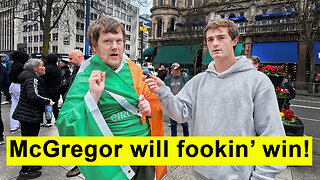 18:11
18:11
Nick Shirley
6 hours ago $3.23 earnedAsking The Irish If They Will Vote for Conor McGregor 🇮🇪
29.9K39 -
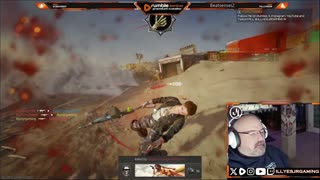 LIVE
LIVE
Illyes Jr Gaming
6 hours agoIt's Wednesday! Let's Hit 300 Followers TONIGHT!
246 watching -
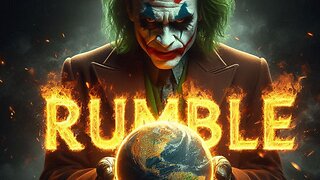 2:40:58
2:40:58
Joker Effect
4 hours agoIs our government safe?***Streamer News***DRAMA***RUMBLE GETTING LEVERAGE***GAMING
38.1K3 -
 14:55
14:55
T-SPLY
8 hours agoDemocrats Accused Of Not Calling Out Joe Bidens Security Disasters
26.9K9 -
 LIVE
LIVE
ZachTheRipper
3 hours agoWe Back With A Passion - 0/20 Subs - Interactive Streamer - #RumbleGaming
162 watching -
 16:19
16:19
Tundra Tactical
7 hours ago $0.87 earnedGEN Z Brit 3D Prints a WORKING Gun!
21.8K8 -
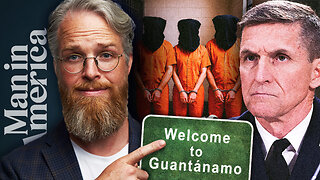 48:01
48:01
Man in America
11 hours agoWHEN WILL THE ARRESTS BEGIN?! w/ General Michael Flynn
30.3K33 -
 3:20:40
3:20:40
BSparksGaming
4 hours agoNear the End? Assassin's Creed Shadows Campaign
19.3K2 -
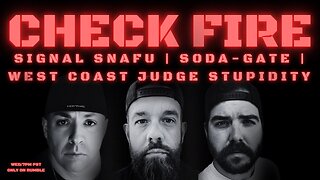 LIVE
LIVE
I_Came_With_Fire_Podcast
11 hours agoSIGNAL SNAFU | SODA-GATE | JUDGE STUPIDITY
160 watching -
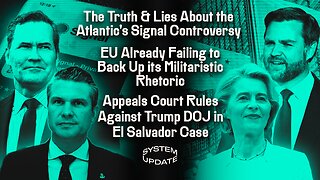 1:46:34
1:46:34
Glenn Greenwald
7 hours agoThe Truth & Lies About the Atlantic's Signal Controversy; EU Already Failing to Back Up its Militaristic Rhetoric; Appeals Court Rules Against Trump DOJ in El Salvador Case | SYSTEM UPDATE #429
129K117